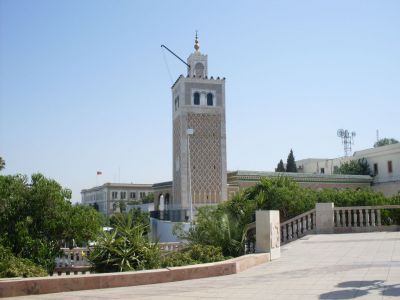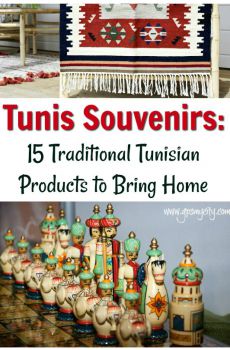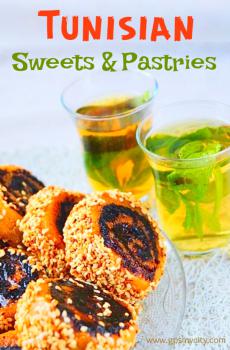Kasbah Mosque, Tunis
The Kasbah Mosque, located in the historic district of Kasbah in Tunis, is a notable religious and architectural landmark. This mosque, listed as a Historical Monument, was commissioned by sultan Abu Zakariya Yahya in the early 13th century. Abu Zakariya Yahya founded the Hafsid dynasty, which ruled present-day Tunisia until the 16th century. The mosque's architect was Ali ibn Muhammad ibn Qasim.
Initially, the mosque was only used as a place of prayer for the rulers residing in the Kasbah area. However, it later became a public mosque for the Friday prayer, open to the whole city. The mosque's wooden minbar was replaced with a stone minbar during the Ottoman period in 1584. The prayer hall of the mosque has a rectangular shape, an unusual feature for Almohad-style mosques of the time.
The prayer hall is divided into seven "naves" separated by horseshoe arches, with nine arch spans for each nave. Marble columns with Hafsid-period capitals support the arches. The hall is roofed by a series of groin vaults, and the mihrab in the southeast wall is decorated with marble paneling and flanked by decorative colonettes.
The mosque's architectural style reflects the ancient local traditions of stone cutting, and its intricate decorative elements, such as the muqarnas (ornamental molding) dome above the mihrab, make it a significant example of Islamic art and architecture. Today, the Kasbah Mosque is a popular destination for tourists and a cultural hub for locals, providing a glimpse into the rich history and heritage of Tunisia.
Tip:
As with other mosques in Tunis, you cannot visit inside being a non-Muslim.
Initially, the mosque was only used as a place of prayer for the rulers residing in the Kasbah area. However, it later became a public mosque for the Friday prayer, open to the whole city. The mosque's wooden minbar was replaced with a stone minbar during the Ottoman period in 1584. The prayer hall of the mosque has a rectangular shape, an unusual feature for Almohad-style mosques of the time.
The prayer hall is divided into seven "naves" separated by horseshoe arches, with nine arch spans for each nave. Marble columns with Hafsid-period capitals support the arches. The hall is roofed by a series of groin vaults, and the mihrab in the southeast wall is decorated with marble paneling and flanked by decorative colonettes.
The mosque's architectural style reflects the ancient local traditions of stone cutting, and its intricate decorative elements, such as the muqarnas (ornamental molding) dome above the mihrab, make it a significant example of Islamic art and architecture. Today, the Kasbah Mosque is a popular destination for tourists and a cultural hub for locals, providing a glimpse into the rich history and heritage of Tunisia.
Tip:
As with other mosques in Tunis, you cannot visit inside being a non-Muslim.
Want to visit this sight? Check out these Self-Guided Walking Tours in Tunis. Alternatively, you can download the mobile app "GPSmyCity: Walks in 1K+ Cities" from Apple App Store or Google Play Store. The app turns your mobile device to a personal tour guide and it works offline, so no data plan is needed when traveling abroad.
Kasbah Mosque on Map
Sight Name: Kasbah Mosque
Sight Location: Tunis, Tunisia (See walking tours in Tunis)
Sight Type: Religious
Sight Location: Tunis, Tunisia (See walking tours in Tunis)
Sight Type: Religious
Walking Tours in Tunis, Tunisia
Create Your Own Walk in Tunis
Creating your own self-guided walk in Tunis is easy and fun. Choose the city attractions that you want to see and a walk route map will be created just for you. You can even set your hotel as the start point of the walk.
Carthage Walking Tour
Carthage is a modern, upscale seaside suburb of Tunis and a unique place of archaeological and cultural value, situated at the site of an ancient capital of the Carthaginian (Punic) civilization, which fell to Rome in the 2nd century BC.
The settlement was founded by the Phoenicians in the first millennium BC and, after being destroyed by the Romans in the course of three Punic Wars, emerged... view more
Tour Duration: 2 Hour(s)
Travel Distance: 4.0 Km or 2.5 Miles
The settlement was founded by the Phoenicians in the first millennium BC and, after being destroyed by the Romans in the course of three Punic Wars, emerged... view more
Tour Duration: 2 Hour(s)
Travel Distance: 4.0 Km or 2.5 Miles
Tunis Introduction Walking Tour
Tunis is the capital of Tunisia and one of the largest cities in the Arab world. Tunis was a Berber settlement founded on and around the ancient city of Carthage. The settlement of Tunis dates as far back as the 4th century BCE. It became the capital city in 1159.
The city was controlled by numerous empires over the years, which has lent to its interesting art and architecture. With influences... view more
Tour Duration: 1 Hour(s)
Travel Distance: 1.8 Km or 1.1 Miles
The city was controlled by numerous empires over the years, which has lent to its interesting art and architecture. With influences... view more
Tour Duration: 1 Hour(s)
Travel Distance: 1.8 Km or 1.1 Miles
Useful Travel Guides for Planning Your Trip
Tunis Souvenirs: 15 Authentic Tunisian Products for Avid Traveler
A historic crossroads of many civilizations and influences, - Berber, Spanish, French, - Tunisia is a treasure trove of mementos waiting for a knowledgeable traveler to be picked up. The Medina market of Tunis (the capital city) is one of the best places to shop for local handcrafts. To help...
Tunisian Sweets and Pastries
No Tunisian meal is complete without a lavish dessert at the end. And Tunisians do take their sweets seriously, be it fresh seasonal fruits, cakes, fried almond pastries, ice cream, doughnuts or whatever else. Some of these delights have come from Turkey, brought by soldiers of the Ottoman army;...







